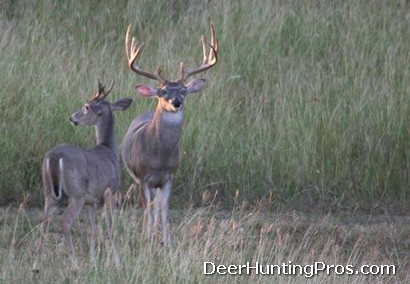Question: “I deer hunt in Texas and like to bring the whitetail to me, so I like to actively hunt. One of my favorite hunting techniques is rattling for whitetails. Rattling antlers for deer can be effective at times, or so it seems, but many times I go home empty handed. I would like to know your opinions on rattling. Knowing that during the rut is the best time for rattling horns, what time of day is best? In the morning, shortly after sunset, mid-day or right before dusk?
When rattling for whitetail bucks, do you use cycles, a few minutes at a time followed by breaks, then more cycles, overall 15 minutes or so? Do you use rattle bag, rattle pack or real horns? Also, is there any benefit to using a grunt call and/or a doe can during the rattling cycles? Looking to take my whitetail deer hunting to the next level. Thank you!”

Response: Rattling for angry whitetail bucks can be a ton of fun! This is one deer hunting technique that a lot of deer hunters forget about, or never try at all, which is unfortunate. The best time of the day to rattle for whitetails is when bucks are up and moving. Pay attention to whitetail deer movement and observing bucks just walking with a purpose, not necessarily feeding.
I rattle antlers in intervals depending on how the bucks respond or do not respond to my rattling. Sometimes bucks will move only when you rattle, other times they run in full speed ahead and sometimes they just sneak in from downwind. I typically rattle 30 minutes off and on in one location and give it a little time. If I don’t see anything then I relocate to another likely ambush point.
As far as rattling, do not be afraid to rattle. Seriously. Get after it! Two bucks fighting are not just playing around. Fighting bucks will be aggressive. If bucks are coming in fast to horns, then pay attention to the first buck you see. He will typically alert to other whitetail bucks when he spots them. Of course, many bucks will sneak in slowly. Some will only move when you rattle and then stop when you stop. It might take some bucks 15 to 30 minutes to come in, so be patient.
Whitetail deer can pin-point your rattling amazingly well, so stay alert. Use your eyes and your ears and pay attention. The majority of bucks will want to circle in downwind of you and check the air before they approach. You need to be scent free when rattling for whitetails too. Use a grunt call or even a deer decoy along with your rattling antlers. This adds another element of real deer, which is what you are supposed to be.
I have found that the snort wheeze is a very effective call to start a rattling sequence. It can also close the distance when a buck has stalled out. No two bucks are the same, so you never know what you are going to get when you start rattling a set of horns. And by the way, I like real antlers even when bow hunting, though they can be a little bulkier.
If rattling from a blind then you might try every 45 minutes or so for 5 to 10 minutes. Many times I will rattle for only a minute and have bucks respond within a few minutes. If you are rattling for whitetails from the ground then make sure you stay put for at least 30 minutes before moving. Again, I prefer to use real antlers and mine are over 10 years old. They still work.
The best time to rattle for whitetail bucks will vary by area depending on rutting activity and and buck to doe ratio. Timing, however, is key to rattling in bucks. The pre-rut can be really good. The deer rut can be good as well, but for me the bucks tend to be locked-in on does and not so much interested in the rattling, other bucks.
The time between the first rut and the second rut is the best time to rattle. I’ve had the most success rattling antlers during this period. Bucks are so involved with looking for does that they will just about run you over in areas with tight sex ratios. Ratting antlers for deer is a great way to spend a day deer hunting. This type of active hunting can be quite effective too, just get the timing right.